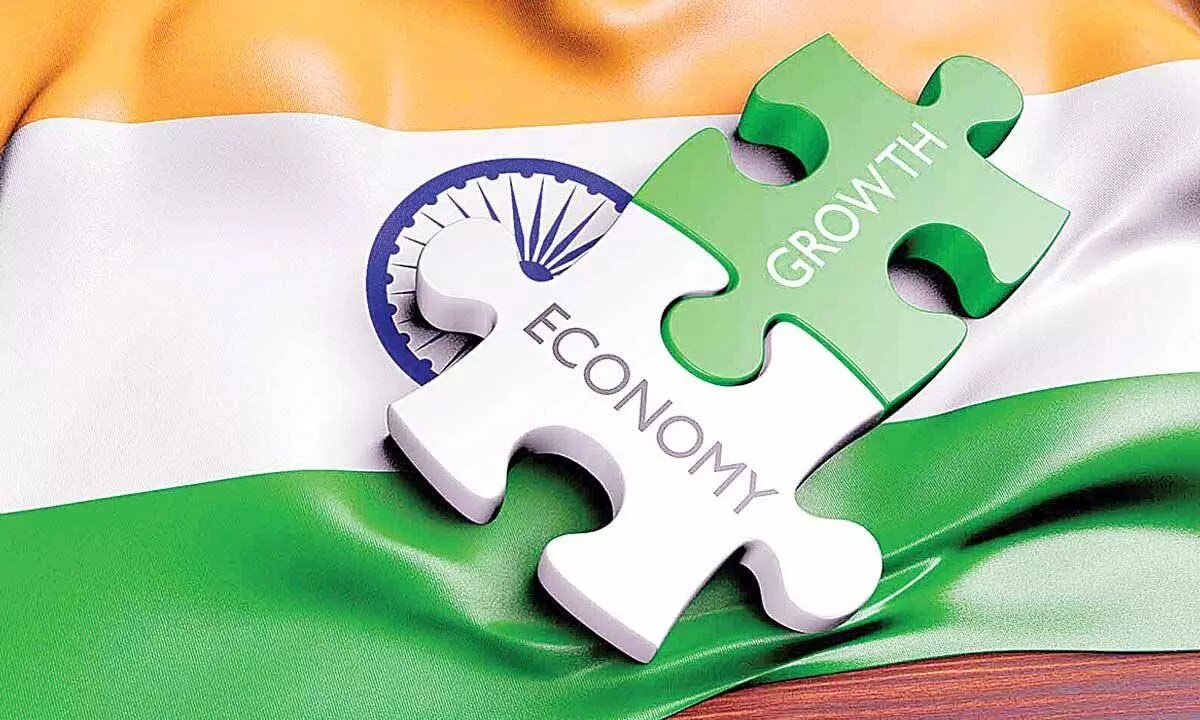Global economic headwinds likely to impact India's higher growth

Global economic headwinds likely to impact India's higher growth
Inflationary pressures are continuing especially in the areas of food and fuel. Manufacturing growth has not risen to the extent needed to push up employment levels significantly
The grim global economic scenario is the theme of the latest annual meeting of the International Monetary Fund and the World Bank. These multilateral financial institutions have used the opportunity to highlight the need to target support to those who need it most at this difficult time. The IMF's World Economic Outlook has revised global growth downward to 3.2 per cent for 2022 and an even lower 2.9 per cent for 2023 while warning that the prospect of recession looms over large parts of the world. For India too, the IMF has downgraded its economic growth forecast for 2022 though it is described as a 'relatively bright' spot compared to many others.
The IMF's projections are being made in the backdrop of the conflict worsening in the Ukraine, and a disappointing performance by one of the world's biggest economies, China, in the current year. Tightening monetary conditions, the highest inflation in decades and the lingering impact of the pandemic have also been factors in slowing down economic growth. The ripple effects of these developments as well as the hardening of oil prices due to output cuts by the OPEC plus cartel have touched all countries whether in the North or South.
As for India, it remains among the fastest growing economies in the world, even if the IMF and the World Bank have cut back their projections for 2022 to 6.8 and 6.5 per cent respectively. This is in sharp contrast to the US which is expected to grow at 1.6 per cent this year followed by a slowing down to 1 per cent in 2023. The Euro area is projected to grow by 3.1 per cent in 2022 and 0.5 per cent next year while China will inch up at 3.2 per cent this year, with a higher growth of 4.4 per cent in 2023.
One of the reasons for the Indian economy looking better than most others is the buoyant inflows of both direct and indirect taxes and timely inflation management. IMF economists have commended the tightening monetary policy of the Reserve Bank of India which may have an impact on growth. The concern, however, is that the government is not implementing enough policies to specifically target those at the bottom of the pyramid such as the free foodgrains scheme. The ability to buy oil at discounted rates from Russia has also played a role in ensuring that India is able to cope with high global crude prices. It has managed to resist pressures from western countries to join the plan to put a price cap on such purchases. This, despite the fact that Russian oil or gas supplied via pipelines to Europe is not attracting any such action in order to maintain energy security of western nations. This is not an issue specifically mentioned by the IMF but it has highlighted the role of energy prices in pushing up global inflation.
The IMF has also recognised concerns over the widening current account deficit owing to a depreciating rupee. There is no doubt this will also affect efforts to contain the fiscal deficit within budgetary targets. Better corporate results and recovery of large industry may be continuing but small and medium enterprises are feeling the pain of high energy prices and costs imposed by disruption of global supply chains. A critical element of weakness remains low investment levels, a factor flagged recently by Finance Minister Nirmala Sitharaman. Exports have also plateaued owing to demand falling in key western markets. Unemployment levels are reported to be improving after the jobs collapse during the two years of pandemic, but high prices are hurting the weakest sections the most. It has thus made eminent sense to continue the free foodgrains scheme for another three months.
Policymakers here would also be well advised to heed some of the suggestions made by the IMF experts on ways to revive the jobs market. While commending the initiatives to invest heavily in infrastructure to raise employment levels, they have underlined the need for the private sector to play a greater role in this regard. This is essential, it is felt, to bring back many of the jobs that were lost during the pandemic. Interestingly, the IMF has contrasted the differing approaches of India and China to deal with the effects of the pandemic. It has commended India's vaccination policy as having been a more judicious use of resources to deal with the issue rather than China's rigid zero-Covid policy.
The fact that India has appeared as an outlier among both developed and developing economies has been highlighted in the World Economic Outlook. The fact is that its faster growth as compared to many others, is also part of the fragile recovery from the pandemic. Inflationary pressures are continuing especially in the areas of food and fuel. Manufacturing growth has not risen to the extent needed to push up employment levels significantly. Private investment also needs to pick up substantially to give the much needed animal spirit to the economy. No wonder then that some institutions like Nomura are already downgrading growth in 2023 to 5.4 per cent and even the IMF has pegged it at 6.1 per cent.
It would thus be wise to avoid any euphoria over the fact that India will be among the world's fastest growing economies this year. Sustaining this level of growth will depend largely on the impact of global headwinds which are looking increasingly adverse owing to the continuation of the Ukraine conflict and the role of OPEC plus in firming up international oil prices.








